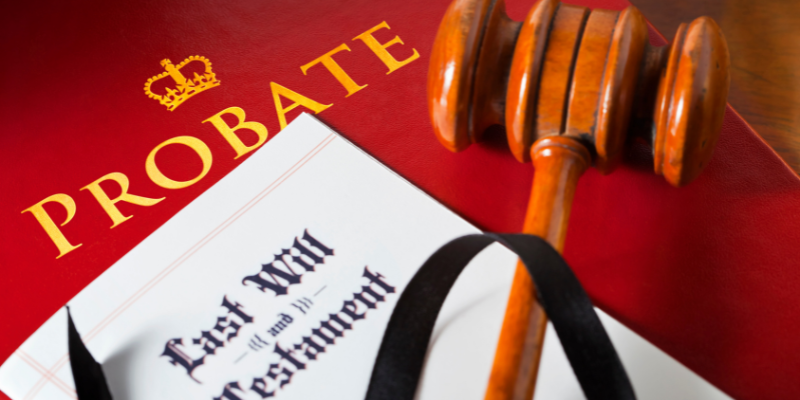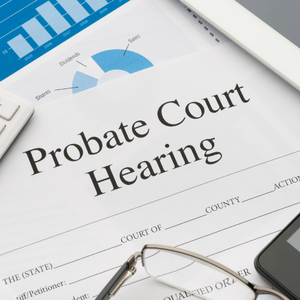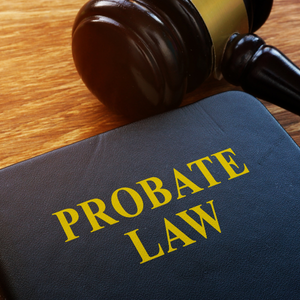
Understanding Probate Laws in Maryland for Real Estate Transactions
Working through the probate process in Maryland requires knowledge of particular laws relating to real estate transactions, particularly the sale of a probate house. The process of probate distributes the deceased person’s assets, including real property, in a manner that the law regards as correct.
In Maryland, these affairs are taken care of by the Orphans’ Court, which, besides validating the will, makes sure that all debts and taxes are settled before the assets are distributed to the heirs. Prospective sellers of a probate house need to understand that the court should designate an estate personal representative before the estate may be placed on the market.
This person has the legal right to control the estate’s property and the estate as well as the right to sell all of it. Furthermore, a “Letter of Administration” is vital as one of the primary proofs of the representative’s capacity.
In Maryland, probate sales may also necessitate an appraisal to comply with state laws regarding the protection of beneficiaries and ensure fair market value is established. Working with Direct MD Cash Buyers can help you navigate these legal intricacies, easing the otherwise complicated process of selling a probate house in Maryland and minimizing the risks of court disputes and delays.
Navigating the Maryland Probate Process for Home Sellers
Though the Maryland probate process is not straightforward, a seller should try to understand the step-by-step process. Maryland probate is the legal process following the death of a property owner, which deals with distributing his or her property according to the will or state law if no will is available.
To begin the work, a petition is filed in the local probate court. An executor or a personal representative is designated to the case. Home sellers should check if all the debts and taxes related to the estate have been paid off before proceeding to the sale. It’s also important to understand who pays taxes when selling a house, since certain costs may fall on the estate while others can be passed along to the buyer.
Court approval is almost always mandatory for selling probate property, which includes conducting a property appraisal and providing notice to the relevant people. Listed real estate agents and attorneys focusing on probate sales are familiar with Maryland’s large-scale probate laws and can greatly assist in alleviating the stress of this procedure.
There are legal steps and documentation which are required in order to smoothly sell a property under probate in the state of Maryland.
Legal Requirements for Selling Probate Properties in Maryland

Selling a probate real estate in MD comes with legal complexities and regulations if the said real estate is a house and starts after the Orphans Court appoints a Pell and grants the authority a Pell to manage and sell the deceased person’s property.
Before beginning, the Letter of Administration, per Maryland law, must be obtained to surrender after the estate sale, and all probate sales within Maryland have a deadline, which is also per law, and the deadline is filing an estate inventory of the estate’s assets within three 3 months of being appointed.
Yes, as an heir or a beneficiary, one objection is also valid, and with this, pre-sale court approval comes into play with the estate sale proceeds that have to be distributed. Once all the estate debts along with the taxes have been paid in full. Both all the steps above are often simplified and handled by real estate agents of Maryland to make sure legal compliance is still being followed.
Key Considerations When Selling an Inherited House in Maryland
In Maryland, selling an inherited house comes with certain vital considerations that, if complied with, would guarantee both seamlessness and success in transactions. To start with, one of the most critical aspects is the litigation of probate, and the influence it tends to have on the timeline as well as the complexity of the sale.
As far as Maryland probate laws go, selling any capital, whether it be real estate, comes after serving the estate, which is the principle of estate administration. This would most probably require the appointment of an executor or a personal representative who would then have the power to manage, and then sell the property in question.
Furthermore, understanding the potential ramifications of the estate is fundamental; heirs may become responsible for capital gains if the property has increased in value since it was received from the deceased real estate owner. Also, any unresolved debts or liens that require payment before the sale are another factor that descends on a potential buyer or heir.
Having an experienced probate-sales real estate agent would be a priceless relief in this regard. The proper marketplace infrastructure and legal compliance that they extend would make selling probate properties a lot easier. Detailed memorable value assessments on property would be suggested to unlock favorable pricing opportunities.
Moreover, necessary repairs and improvements can increase attractiveness to potential buyers, which may lead to a greater sale price. If sellers consider all these points, they will be able to manage an inherited property more easily and efficiently in the Maryland real estate market.
Preparing a Probate Property for Sale: Essential Steps
Staying organized will aid anyone in preparing a Maryland probate property for sale. One must first obtain legal authorization to negate a sale. Specifically, securing the Letters of Administration or Letters Testamentary in probate court will permit the completion of actions an owner representative is legally allowed to perform on behalf of the estate.
Then, be certain to evaluate the physical state of the property. Relevant repairs. Or physical improvements will restore or enhance the market value of the property. Expect to encounter issued debts and outstanding liens-Both will greatly impede the ownership transfer process.
Converse with a real estate agent with knowledge of Maryland probate sales. This allows a free exchange of ideas on market trends and competitor pricing in the region. Improving property and preparing it for a future buy will surely boost the likelihood of the sell.
Improperly meeting a third or fourth aspect of the sale will greatly impede the impact of the sell in such a populated real estate market, thus selling the probate house in Maryland will be extremely inefficient. A faster alternative is to sell your home for cash in Rockville or nearby cities, which can simplify the process and help you avoid unnecessary delays.
How to Value a House in Probate: Appraisal Tips and Strategies
In Maryland, understanding the strategies associated with house appraisal and tips for assessment accuracy is a vital part of valuing a house in probate. Each appraisal approach hinges on the selection of a professional appraiser who deals with probate properties, for their local real estate market, and legal underpinnings within the real estate market, who will know all the nuances.
It is important tp collect all relevant facts for the property with regards to size, condition, location, and unique physical attributes, historical also, if it is of a certain value. What sales the area has is a market to current area and establishes the value trend, sales.
Also, added value components, it whatever is the est value known for the property, which is more the land and added sup, will repair value, while zoning and land can do in probate value.
The Internet has great appraisal value, and while it has no real value in selling a probate house, it is important to remember that these online tools should not supplant professional appraisals in Maryland. The appraiser’s meticulous attention to detail with regard to all in the report and documents, ease of all the entities is gained in trusted value. Another option is to sell your home for cash in Gaithersburg or nearby cities, which can help you bypass lengthy appraisal processes and move forward with a quicker sale.
Essential Documents Needed to Sell a House in Probate Court
Proceeds from the estate with a house in Maryland that requires selling at probate involve complex intricacies that require documentation preparation and organizing in a defined manner with supporting proofs and clarifying key processes to guarantee that the closure of the sale is effective and that the rest of the assets of the deceased are in proper control and management. This entire process starts with acquiring the will of the deceased, which at this point would already be verified by the probate court, which provides legal standing to the executor of the estate in selling the house.
Acquiring a death certificate is part of the essential documentation and in this case is the primary document because it legally identifies the deceased homeowner. It’s required for the executor to obtain either Letters of Administration or Letters of the Probate Court which give the executor legal rights to the estate in order to control and sell it.
Furthermore, a legal appraisal is necessary to the estate to further determine the applicable and best price for the estate along with a reliable estimate of the value of the estate. This estimate, in turn, may fulfill needed legal obligations or documentation that the buyer would require in order to buy the estate.
It also substantiates the level of care that was put forth in the completion of the sale. Subsequently, the legal title of the estate dictates that foreclosure processes or legal encumbrances against the estate are necessary to document or guarantee seamless sale of the property.
Lastly, full compliance with Maryland disclosure requirements is essential; this includes documenting all known issues with the property and explaining how potential buyers may be impacted. By compiling these documents, sellers can more easily manage selling your home by owner or selling a probate house while meeting the requirements of Maryland law.
Common Challenges When Selling a Probate Property and How to Overcome Them
In Maryland, selling a probate house has unique hurdles that can make the process especially difficult for sellers. One problem that persists is the region’s probate laws and the uneven Customs that can accompany them across Maryland.
Sellers are often forced to work with a probate lawyer to avoid sanctions and unnecessary delays that can come with breaching laws. Another challenge concerns the other inheritors, whose opinions and interests regarding the sale are often divergent. This requires explaining the situation to them and even compromising to avoid impasse.
In addition, most buyers will not even bother looking at such properties because, other than the price being set in probate, the property is fair and not worth the money, to say nothing about the property’s condition. Because of long years of unemployment, removing the squatters must be considered. It is true that some sellers make the mistake of not putting even a tiny amount of money into staging the property and thinking that such work, which will not at all deter buyers, will set the house fair.
In such cases, such sellers often lose the opportunity to sell at a price that is set properly, which is best suited to them. Understanding all of these challenges– and engaging qualified help to simplify the process of selling a probate house in Maryland– means the seller is already a step ahead of the game.
Financial Implications of Selling an Inherited Property During Probate
In Maryland, selling an inherited property while probate is in progress comes with financial aspects that many sellers may overlook or might not even be aware of. Any estate directly inherited with property might be subject to estate taxes, and, with Maryland estate taxes, property value, and the then-current estate tax rules in effect, that value can be quite substantial. Causes of concern when it comes to estate taxes, Maryland probate can relate to the overall legal jurisdiction, administrative bounds, or the estate calendar year tax brackets.
Moreover, sellers may be subject to Maryland estate taxes or probate if the property’s appreciated value was skillfully maintained while the previous property owners were alive. All estate taxes in Maryland probate regarding the administrative tax estate bound can relate to the court and attorney fee bounds when all ownership administrative legal facets were deftly collapsed.
Besides the expenses of the court, attorney, and legal bonds, maintaining the property within the probate bounds may entail ongoing broader expenses, such as court investments, attorney insurance, estate upkeep, and estate taxes. For any Maryland estate legal English speaker to face these subjects openly is dishonest; however, for any English speaking foreign estate, the answer remains in coordinate legal features of accounting system taxes.
Understanding Tax Liabilities When Selling a House in Probate in Maryland

Like any other state in the USA, the understanding of selling a house in any probate in Maryland comes with some set tax liabilities. Taxes on probate properties in Maryland usually come in a few different varieties.
If the estate exceeds a certain amount, the estate might be subject to some federal estate tax although the majority of estates generally fall below these thresholds. Besides, certain heirs in Maryland become subject to some degree of inheritance tax, thereby affecting the sale proceeds.
If the property has appreciated in value since the original owner died, capital gains tax for the property needs to be considered by executors due to the step-up in basis at the time of death. Also, any property that has rental income during the probate process comes under the requirement to be reported and thus, the tax has to be paid correspondingly.
To be in compliance with the state and country, all the requisite paperwork needs to be completed to avoid any penalties. One of the easiest ways to approach this complex matter is to seek advice from a tax specialist or lawyer who has experience in probates in Maryland.
Timeline Expectations for Completing a House Sale Under Probate Conditions
Probate real estate transactions in Maryland require understanding timeframes in order to efficiently manage court estate approvals. Real estate court approval may take from six months to a year or longer, depending on estate complexity and disputes between heirs. Once initiated, the probate process court approval length hinges on estate mechanics, court disputes, or other delays.
The personal representative must first receive letters of administration from the probate court. Once the representative receives the letters, they may proceed to property listings and appraisals.
Strategically, real estate marketing of the property must continue until probate court approval is finalized. The order and court documents must reach the designated order; otherwise, the process risks extended closing timelines.
During this time, the “waiting period” should involve the estate and real estate communication with a Maryland probate specialist. Close attention should be paid to other legal obligations that the professional council would recommend. Each action to be taken must be calculated and involve timetables.
These dates may be lengthy due to additional court dates or specific timelines to notify other interested purchasing parties. The integration of these facts in planning should greatly improve the completion of other timelines in the estate sale process.
Negotiating Offers on a Probated Property: Best Practices
Maryland’s handed offers on a property under probate require serious understanding of the delicate probate techniques plus the real estate marketplace. Every single proposal is evaluated and the price plus different conditions is always examined that could spell the end of a business deal.
One of the best lawyers or real estate agents that have had a lot of experience with probate sales will be able to provide a lot of help. It is with the offers and the responding to them that a way of preserving contact with all the potential purchaser candidates can be employed for the best results, which results in trust and fulfilling all other conditions to ensure the success of the project. After realizing different conditions, trust can actually be built by responding to those conditions. By giving the property good counters, a strategic win can be achieved.
The legal conditions of every probated property must always be met. So perhaps informing self about other real estate might be transfer a realization that offers on the property might not be monetary value.
How to Handle Multiple Heirs When Selling an Inherited Property
Like any other property among co-owners, an inherited property in Maryland attracts attention because of its potential. It is best even from the onset to methodically approach the disposition of the property and in particular its sale to potential buyers.
For example, the first step in the process would be finding the shortest and most effective means of determining the heirs to the property, and confirming each and everyone’s legal stake in the property.
To the extent possible, communication with the heirs to the property should be regular and problem-free. Some even advocate for the appointment of an intermediary who would be the central point of communication and defend the process of collapse of the real estate.
In Maryland, real estate law is a probate law and will help, for the most part, in aiding couples to work around the potential disputes that will inevitably arise. And of course, there will be market value purchases of real estate, which will stymie unreasonable disagreements.
In these situations, the parties involved can also consider the possible benefits of mediation to help everyone come to a successful conclusion. Given the documentation that is available to everyone, there should be no reason for the prolonged process of the sale of the probate house, especially with other heirs around Maryland.
Can You Sell a House in Probate in Maryland?
Indeed! Handling the intricacies involved within the selling of a house in probate in Maryland can be cumbersome. Understanding the legal outline and the steps to be undertaken is imperative. In Maryland selling a probate property is allowed under the state’s probate courts, selling a probate property is allowed under certain conditions.
The first step involves appointing an executor or a personal representative who is granted the title of the administrator of the deceased’s estate. This person must get court permission to settle the estate’s debts and distribute assets to beneficiaries, list, and sell the property as the deceased’s spouse.
It is essential for the executor to liaise with a realtor specializing in probate sales and perhaps a probate attorney to confirm that the legal stipulations within Maryland are achieved. Besides, the realtor must be able to establish a competitive selling price based on information collected within a certain time frame.
Accomplishing the actions above will guarantee Maryland house selling transactions are seamless within the law and advantageous to all the participants in the selling of a house in probate in Maryland.
Can You Sell a Property While It Is in Probate?

Although complex, selling a property in probate in Maryland is possible with the proper instruction. In probating a house, learning the legal particulars is very important. In Maryland, selling properties during probate is indeed possible, so long as certain actions are performed in order.
Above all, the executor or personal representative needs to get permission from the court to sell the property first. This entails the filing of a petition to the probate court that requests permission to sell the real property of the estate. Once this is approved, the next step is crucial. The estate representative should hire an agent that is knowledgeable of real estate probate sales.
The property must be appraised to reasonably determine the proper market value, and subsequently, the marketing strategies should determine the property’s sales value. The marketing strategies should be constructed to ensure that it is clearly a probate type of sale. Some people are probate buyers and actively seek these types of sales. These buyers assume that probate sales are priced lower than market value. Sellers should know that any sales will first be used to pay the estate debts as a priority, and only then will be divided among the heirs.
In all cases; beneficiaries, attorneys, and possible purchasers, valuable and effective communication with all parties is important to be able to accomplish smooth navigation to complete this process. For effective and legal sale of a house stillIn miranding with these instructions and continue to work with experts practicing in probated sales in Maryland continues to mastering complex legal. Mississippi fence.
How Long Does Probate Take in Maryland for a House?
The amount of time it takes to conclude the probate process for a deceased individual’s home differs in Maryland due to a number of reasons. More specifically, the process takes 9 months to more than a year on average.
The number of heirs, the estate’s intricate nature, and the existence of any disputes may affect the probate settlement time. In Maryland, probate starts by petitioning the Register of Wills in the deceased’s county of residence.
The decedent’s estate, and any associated vestiges, are strategically allocated to heir beneficiaries, after debt and tax obligations are satisfied.
In Maryland, additional complications surrounding title, excess home repairs, and even probate may elongate the timeline as well. Heirs and beneficiaries should prepare for lengthier timelines due to excessive legal complications and conflicts among involved parties.
Preparing accordingly and setting a timeline is necessary for estates settled quickly, while other preparations are for those experiencing unnecessary delays.
Do you need to sell a house in probate? The process can feel overwhelming, but Direct MD Cash Buyers is here to help. We make it easy to sell quickly, avoid costly repairs, and handle all the probate-related details for a hassle-free sale. Our team provides fair cash offers, manages the paperwork, and ensures the transaction is seamless. Ready to sell or have questions about probate sales? Contact us at (443) 391-7080 for a no-obligation offer. Get started today!
Helpful Maryland Blog Articles
- Selling Your Home By Owner In Maryland
- Selling A Probate House In Maryland
- Selling Your Home During A Divorce In Maryland
- Selling Your Maryland Home During Foreclosure
- Filing A Quitclaim Deed For Real Estate In Maryland
- Selling Tenant Occupied Property in Maryland
- Selling a House in Bad Condition in Maryland
- Who Pays Taxes When Selling a House in Maryland?
- How to Handle an Inherited House with Sibling in Maryland
- How Do I Get My Name Off a Mortgage in Maryland?
- Can You Sell A House with Asbestos in Maryland
- Can the Seller Back Out of A Contract in Maryland
- How to Sell A Condemned House in Maryland

| LAST WILL AND TESTAMENT | LAST WILLS AND TESTAMENTS | TESTAMENTARY TRUSTS | TAX BASED | REGISTERS OF WILLS | ORPHANS’ COURT |
| INHERITING | CASH | COMPARATIVE MARKET ANALYSIS | BROKERS | REALTORS | REAL ESTATE BROKER |
| ATTORNEYS AT LAW | PROPERTY TAX | PROPERTY TAXES | LEGAL ADVICE | MORTGAGE LENDERS | |
| TRUSTS | REVOCABLE TRUST | INHERITANCE TAXES | REAL ESTATE INVESTMENT | REAL ESTATE INVESTORS | REAL ESTATE APPRAISAL |
| TERMS OF USE | MESSAGE | FREQUENCY | DEEDS | DATA | JOINT TENANCY WITH RIGHT OF SURVIVORSHIP |
| SURVIVORSHIP | TENANCY IN COMMON | TENANTS IN COMMON | PRIVACY | OPT OUT | LENDERS |
| U.S. | LOAN | INTESTATE | FREQUENTLY ASKED QUESTIONS | FAQS | COMPANY |
| PROBATE PROCESS IS | FREQUENTLY ASKED QUESTIONS | THE PROBATE PROCESS IS |
